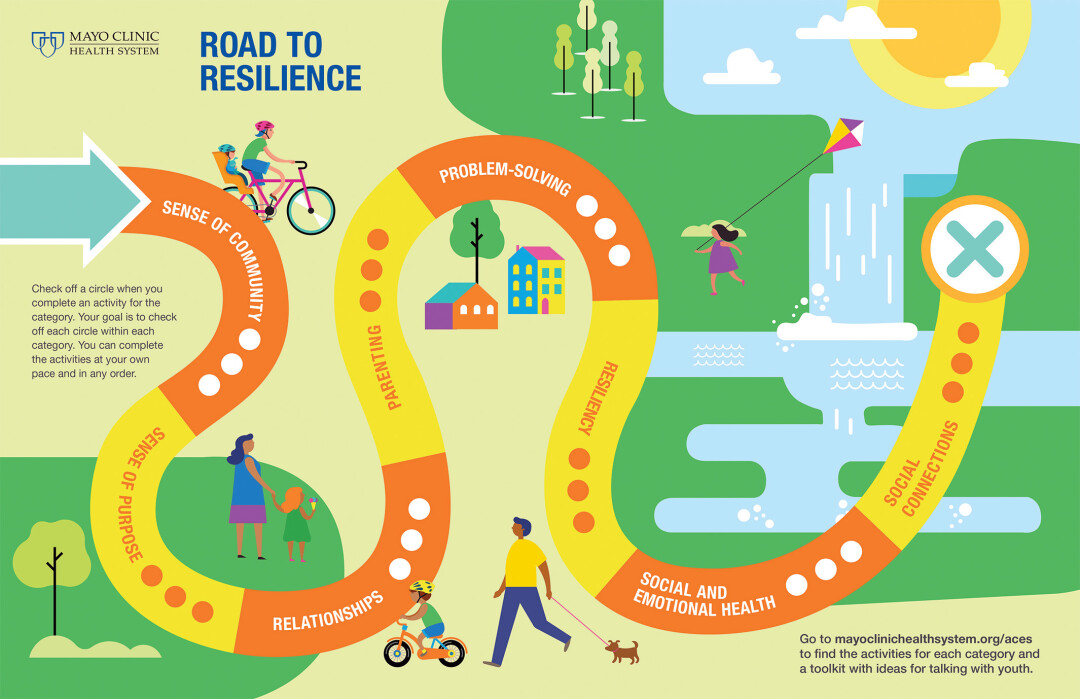Road to Resilience: Raising Healthy Kids
New online program aims to build children’s coping abilities

To help improve the health of local communities, Mayo Clinic Health System is rolling out a free program called “Road to Resilience: Raising Healthy Kids.” The program is designed to build coping skills with youth in an effort to help them better overcome life’s challenges and offset the impact of adverse childhood experiences (ACEs).
Examples of ACEs include:
- Parental divorce or separation.
- Incarcerated household member.
- Substance misuse within the household.
- Depression or other mental illness in the household.
- Physical and emotional neglect.
- Physical, emotional, and sexual abuse.
- Mother treated violently.
Experiencing these traumas as a child can impact long-term health and well-being, factoring into the adult onset of chronic diseases, such as diabetes, heart disease and depression, as well as an increased risk of suicide attempts, drug abuse, and other social problems. These issues often are passed down from one generation to the next. But together, the community can work to break the cycle. Research suggests that just one stable adult relationship can help support youth through difficult times and provide a buffer for the effect of ACEs. Those adults often are parents, grandparents, teachers, coaches, and others who are already in kids’ lives.
ACEs occur more commonly than you’d expect. In Wisconsin, more than half of all adults have experienced one adverse childhood experience in their past. The more ACEs an individual has experienced, the higher their risk climbs for lasting health impacts. While ACEs are related to health and behaviors later in life, they are not a guarantee of anything. Adults can provide a strong support system to strengthen a child’s resilience. This can help children successfully cope with life’s challenges and lessen the consequences of ACEs.
HOW TO PLAY
Mayo Clinic Health System has created a six-week game-like virtual program with age-appropriate resources for participants to read, watch, or do together with their youth. All the program materials are available at mayoclinichealthsystem.org/aces, including the registration link, resources, instructions, conversation prompts and a game board to track progress.
The goal is to complete at least three activities in each of the eight categories at one’s own pace and in any order. Participants will learn skills in these categories: sense of community, sense of purpose, relationships, parenting skills and support, problem-solving skills and self-regulation, resiliency, social and emotional health, and social connections. At the end of the challenge, those who formally sign up will receive an evaluation via email. Evaluate the program to receive a small participation prize via U.S. postal mail for each child in your classroom.
SIGN UP TODAY
Community members should go to mayoclinichealthsystem.org/aces to register for the program. Registrants can expect a weekly email to help keep them on track and provide further learning.
Consider joining Mayo Clinic Health System’s program to help the youth in your life build resilience.
Sara Carstens is the director of Community Engagement and Wellness for Mayo Clinic Health System, a community partner of Chippewa Valley Family. Sara has been with Mayo Clinic Health System for 10 years. She and her team help bring health programming to communities in western Wisconsin.




















